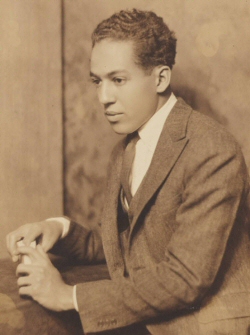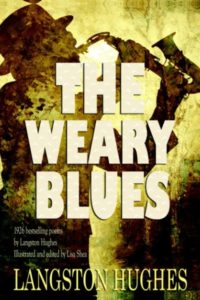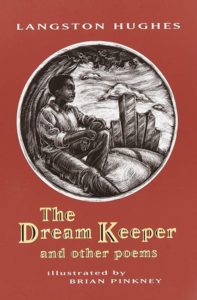The young Langston Hughes wrote poems for adults — and children
In 1924, a young Black man named Langston Hughes (1902-1967) arrived in New York City. Born in Joplin, Missouri, he had lived in a considerable number of places and traveled as a sailor to even more. But it was to New York he came, and it was there he would not only make his literary name but lead what came to be known as the Harlem Renaissance.

The young Langston Hughes
Two years after his arrival, he published his first poetry collection, The Weary Blues. Almost a century after its publication (and now off copyright), it continues to read like contemporary poetry. He writes about his experiences, his people, his travels, music, the South, and his family. The words and ideas are all projected through the lens of race; this is a Black man writing and living in 1920s America. He had experienced Mexico, America, Europe, and Africa; he knew the cultural and social differences. And he writes powerfully, with simple language that often grabs you by the throat.
Hughes expresses the story of himself and his people though music and dance. He describes his dreams. He employs the metaphor of the river, describing how rivers — the Congo, the Nile, the Mississippi — have played such a crucial role in the history of Black people. And he invokes the power of stories and how stories have kept hope alive in the worst of times.
Aunt Sue’s Stories

Aunt Sue has a whole heart full of stories.
Summer nights on the front porch
Aunt Sue cuddles a brown-faced child to her bosom
And tells him stories.
Black slaves
Working in the hot sun,
And black slaves
Walking in the dewy night,
And black slaves
Singing sorrow songs on the banks of a mighty river
Mingle themselves softly
In the flow of old Aunt Sue’s voice,
Mingle themselves softly
In the dark shadows that cross and recross
Aunt Sue’s stories.
And the dark-faced child, listening,
Knows that Aunt Sue’s stories are real stories.
He knows that Aunt Sue
Never got her stories out of any book at all,
But that they came
Right out of her own life.
And the dark-faced child is quiet
Of a summer night
Listening to Aunt Sue’s stories.
Included in The Weary Blues is Hughes’ first published poem, “The Negro Speaks of Rivers.” It had originally been published in The Crisis, the official publication of the National Association for the Advancement of Colored People (NAACP), in 1921. (His last published poem would also appear in The Crisis.) After The Weary Blues, he continued to write and attended school, eventually graduating from Lincoln University in Chester County, Pennsylvania, in 1929. He continued to write poetry, fiction, nonfiction, and plays.
As still a young man, and still early in his career, Hughes recognized the importance of poetry for children.
In 1932, he published The Dream Keeper and other poems, primarily written for younger readers. Several of the poems are written in the style of folk songs, which we would call the blues. Their rhythm and cadence would have been familiar to even younger ears. Most of the poems are short, what you would expect to find in a collection of children’s poetry. But the subjects and themes are different; these are poems primarily for Black children.
Song

Bare your bosom to the sun.
Do not be afraid of light,
You who are a child of night.
Open wide your arms to life,
Whirl in the wind of pain and strife,
Face the wall with the dark closed gate,
Beat with bare, brown fists—
And wait.
Hughes died in 1967 from complications after surgery for prostate cancer. He left a large body of work and achievements for both Black people and American letters generally. He told stories that needed to be told and stories that needed to be heard.
Photo by Noah G, Creative Commons, via Flickr. Post by Glynn Young.
How to Read a Poem uses images like the mouse, the hive, the switch (from the Billy Collins poem)—to guide readers into new ways of understanding poems. Anthology included.
“I require all our incoming poetry students—in the MFA I direct—to buy and read this book.”
—Jeanetta Calhoun Mish
- Robert Waldron Imagines the Creation of “The Hound of Heaven” - April 8, 2025
- Poets and Poems: Luci Shaw and “An Incremental Life” - April 3, 2025
- Ben Palpant Talks with 17 Poets About, Well, Poetry - April 1, 2025


Mary Harwell Sayler says
Love his work, especially “The Negro Speaks of Rivers,” bu I didn’t realize it was his first published poem. Thanks. Glynn.
Bethany says
Thank you for sharing this with us. I didn’t realize that he had written poems for children. And what a poem, “Aunt Sue’s Stories,” is.